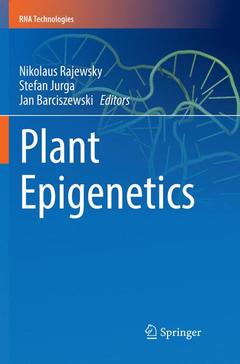Plant Epigenetics, Softcover reprint of the original 1st ed. 2017 RNA Technologies Series
Coordonnateurs : Rajewsky Nikolaus, Jurga Stefan, Barciszewski Jan

This book presents, in 26 chapters, the status quo in epigenomic profiling. It discusses how functional information can be indirectly inferred and describes the new approaches that promise functional answers, collectively referred to as epigenome editing. It highlights the latest important advances in our understanding of the functions of plant epigenomics and new technologies for the study of epigenomic marks and mechanisms in plants. Topics include the deposition or removal of chromatin modifications and histone variants, the role of epigenetics in development and response to environmental signals, natural variation and ecology, as well as applications for epigenetics in crop improvement. Discussing areas ranging from the complex regulation of stress and heterosis to the precise mechanisms of DNA and histone modifications, it presents breakthroughs in our understanding of complex phenotypic phenomena.
Date de parution : 07-2018
Ouvrage de 536 p.
15.5x23.5 cm
Date de parution : 05-2017
Ouvrage de 536 p.
15.5x23.5 cm


